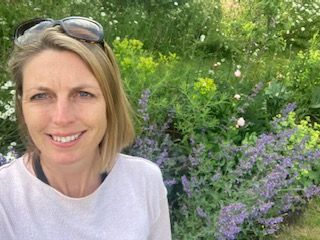My View: Louisa Fowler
CA-WN gives a Councillor the space to speak about climate action.

West Northants Councillor for Towcester & Roade reflects on how even small steps can help fight climate change - even in your garden
The only way forward, if we are going to improve the quality of the environment, is to get everybody involved.
Richard Rogers
Does the little I do make a difference? Can what I do challenge the waste and consumption of others? Is there any point in cutting out one car journey when Putin is rolling tanks across Ukraine? In my more optimistic moments I believe that if everybody did one little thing each and every day, it could add up to significant reductions, and I believe that the role of those of us who care about the environment need to push that message - too many people believe that there is nothing that can be done and make no alterations to their patterns of behaviour.
Sustainable West Northants, which invites all of us to make a pledge to become more sustainable, aims to help all of us to focus on the little things we can do, so that together we can make a big difference. This echoes the sentiment of CA-WN, and it was that optimism which drew me to the group in the dark days of lockdown Two.
At home, many of the pledges I have made over the last two years have revolved around the garden. Two years ago, during No Mow May, I stopped mowing a large section of my garden, and over successive lockdowns I dug out the top layer of grass (putting it on my compost heap) and I spread seeds that were beneficial to wildlife.
At the same time I eradicated the use of all chemicals in the garden which also means I am no longer buying products which come in plastic bottles. Although the garden looked under attack last summer, this year a level of natural harmony already seems to be achieved, with my roses looking particularly happy. They may be so pleased with themselves because they are constantly getting juice from the wormery, or the hotbin, or from the nettle soup I make - all measures which have eliminated plastic, freight miles and chemicals. Although the wormery (£100, recycled plastic) and hot bin (£225, made in Northampton) were both investments, my compost heap was free to make from old materials. For the wall I used old stakes which had come with plants and then lined it with cardboard.
I have not bought a plant in a plastic pot since 2020; The Hairy Pot Plant Company supply great quality plants in compostable plant pots which disintegrate into the soil when you place in the ground (although you can actually reuse the pots, too). I also have six raised beds - but I cannot even begin to suggest I am self-sustaining. I do know, however, that in growing my own I have developed a much more seasonal approach to cooking which reduced air freight miles even further.
I am fortunate to have space, but I genuinely believe that our role in CA-WN is to remind everyone that every tiny change we make can create impactful difference. If we all grew (and ate) salad leaves on a windowsill it would reduce plastic packaging, improve our health and reduce air miles. The message we need to communicate, as an action group, is that all of us can act together, taking small steps to achieve big changes.
I recognise that as a councillor for WNC I have increased responsibilities, and working on the Tree Task and Finish Group has been an interesting experience. We have been determined that the council will invest in a tree officer, and that will be reflected in the final policy. I would love to see us invest in edible forests, run by community groups, and the idea of collective planting as a council is a matter we are investigating. However, I have also had to realise that whilst I may wish to plant trees everywhere, for some people they are a nuisance: blocking light, threatening foundations and causing potential harm. That is why our own sustainability pledges are so important: it reminds us all that we can take individual, important steps which collectively improve our natural world.
